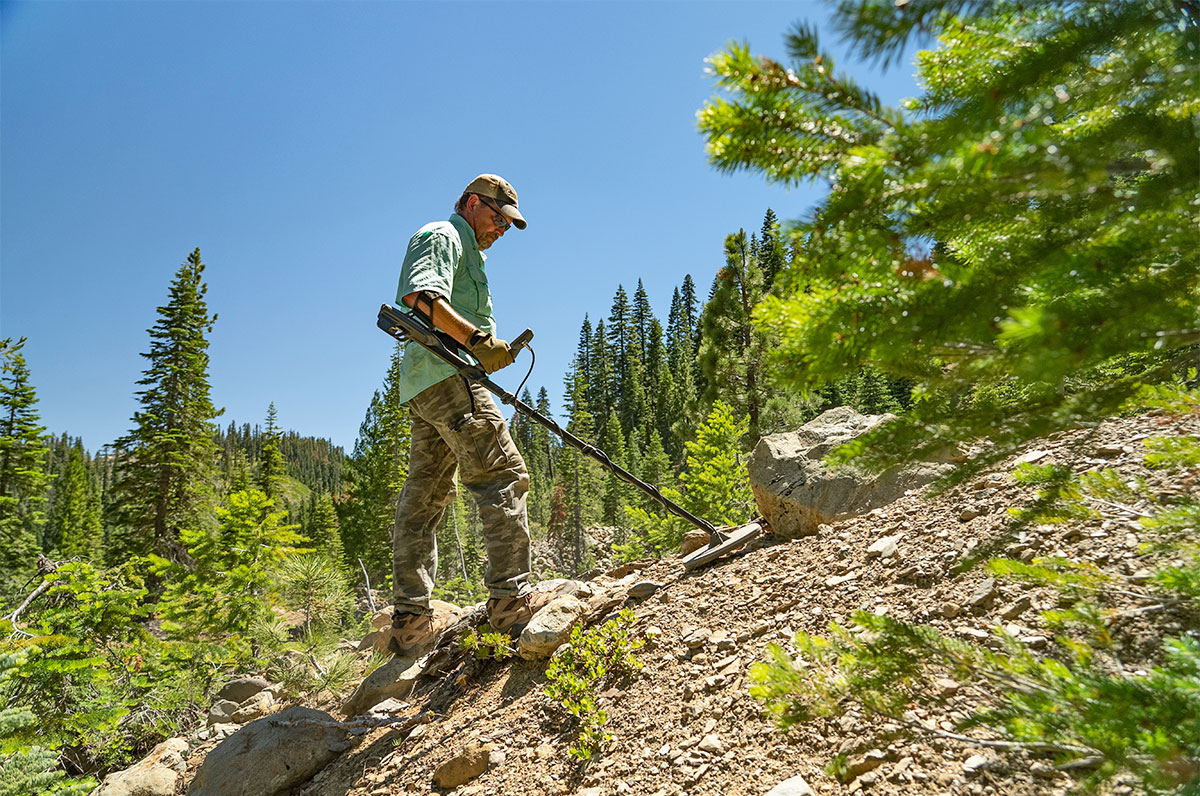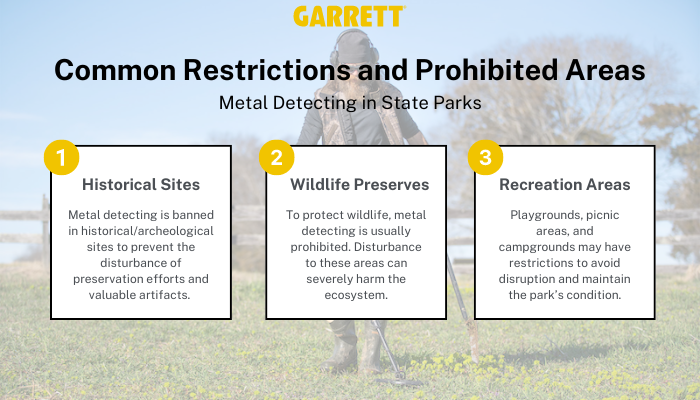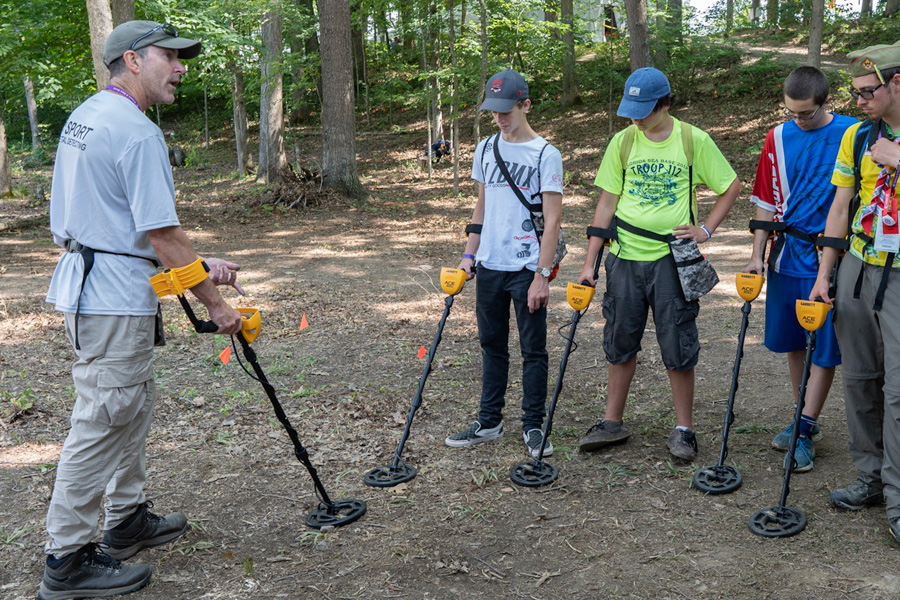Understanding and Following Metal Detecting Laws
Generally, you can metal detect in state parks, but the rule is that each state park has specific regulations you must follow. While some parks allow metal detecting on public property, others may require a special permit or have restrictions in place to protect the area.
Why Metal Detect in State Parks?
Metal detecting is a popular hobby for enthusiasts, offering them the thrill of discovering hidden metal objects. State and national parks are often prime locations for this hobby, as they are heavily visited and can house many valuable items, from historical artifacts and old coins to lost jewelry and relics.
However, it’s important to note that while some parks welcome metal detectorists and might even designate specific areas for this activity, others may have stricter regulations or complete bans to protect natural and cultural resources. These regulations are in place to preserve the integrity of the parks, safeguard wildlife habitats, and protect archaeological sites from disturbance. Always check the specific rules of the park you plan to visit and obtain any necessary permits to ensure a respectful and lawful experience. Your adherence to local park restrictions is essential: follow the law, and keep the door open for future hunters.
Understanding the Rules and Regulations
State park areas often contain valuable artifacts and sensitive environments that can easily be damaged by unregulated digging and searching. By enforcing certain regulations, state park facilities can ensure that historical sites and natural habitats are protected.
Common Rules for Metal Detecting
A metal detector permit is often required to help manage and monitor metal-detecting activities. Prohibitions can also be placed on metal detecting in designated historical sites or wildlife areas. This activity may be limited to specific times outside of peak visitor hours or during certain seasons to minimize disruption to other park activities.
By understanding and adhering to these regulations, users can enjoy their activities responsibly while also protecting the valuable resources found within these parks.
Checking Metal Detecting Rules for Specific State Parks
To find up-to-date information on metal detecting rules for specific state parks, it’s best to check the park’s website or contact the park office directly. Some park websites will provide detailed guidelines, maps of designated areas where it’s legal to metal detect, and specific information on how to obtain the necessary permits. Speaking with park staff can also give you a clearer understanding of the rules and any recent changes in the park’s regulations.
It’s crucial to obtain any necessary permits and comply with all guidelines to ensure that your metal detecting activities are lawful and respectful of the park’s regulations. Following these steps helps preserve the integrity of the park and ensures that activities like this can continue responsibly.
Common Restrictions and Prohibited Areas
State parks typically place restrictions on metal detecting to protect sensitive areas and resources. Common restrictions you might encounter include:
- Archeological and Historic Sites: Metal detecting is often banned near these sites to prevent disturbance of preservation efforts. These areas are protected by state law, and unauthorized digging can result in severe penalties.
- Wildlife Preserves: Metal detection is usually prohibited to protect wildlife ecosystems. Disturbing these areas can harm the environment, which is why strict regulations are in place.
- Recreation Areas: Certain spots like playgrounds, picnic areas, and campgrounds might have restrictions to avoid disrupting park visitors and maintain the area’s original condition.
Despite these restrictions, metal detecting might be allowed under specific conditions. Some parks have designated areas where metal detecting is permitted. These areas are chosen to balance the activity with conservation efforts, allowing users to enjoy the hobby without causing harm. In some cases, you can obtain special permission from park managers to metal detect on private property or in restricted areas. These permissions usually come with guidelines to ensure that detecting is done responsibly and without damage to the park’s resources.
Consequences of Non-Compliance
Non-compliance with metal detecting rules can lead to serious consequences:
- Fines and penalties
- Confiscation of equipment
- Bans from the state park
Violating these rules can result in fines and other legal penalties, as they are enforced to protect the park’s resources and discourage irresponsible behavior. Park authorities may also confiscate your metal detector and equipment if you are found in violation of the rules. In severe or repeated cases, violators can be completely banned from the park property.
Promoting Responsible Metal Detecting
Practicing responsible metal detecting is crucial to ensure that parks remain accessible for this hobby. By adhering to necessary regulations, obtaining the right permits, and respecting designated areas, metal detectorists can help preserve the natural resources of state parks. Responsible practices not only protect the environment but also support the continued permission for metal-detecting activities in these public spaces. If you are allowed to detect, make sure to haul out all metallic trash you find, as you will be helping to clean these areas in the process of your search.
Successful Metal Detecting with Garrett Metal Detectors
Choosing the right equipment can enhance your metal detecting experience, ensuring compliance with state park rules and increasing your chances of making successful discoveries. High-quality metal detectors can help you navigate different terrains, accurately identify valuable targets, and adhere to the specific guidelines set by state parks.
At Garrett, we design and manufacture metal detectors that are suitable for a variety of environments, from recreational activities and sport to professional security applications. We also offer a range of accessories to enhance treasure-hunting adventures. From gold pans and digging tools to carry bags and headphones, we provide everything treasure hunters need to make their experience more efficient and exciting.
Our metal detectors are known for their reliability, long-lasting performance, and advanced technology. Key features that make our equipment stand out include:
- Pinpointing Targets: Precise pinpointing helps users accurately locate and identify targets, reducing the need for excessive digging and minimizing ground disturbance.
- Ground Balance: Some models have advanced ground balance, allowing them to perform on different types of soil, from highly mineralized ground to saltwater beaches.
- Waterproof Capability: Various models are built to handle wet conditions, allowing you to search in shallow water without compromising performance.
- Ease of Use: User-friendly interfaces and adjustable settings make our detectors ideal for beginners and experienced users.
With Garrett, you’re not only investing in a high-performance tool but also committing to responsible metal-detecting practices. We encourage all users to act responsibly and respectfully in the environments they explore. Make sure you have the right equipment, follow state park rules, and respect the environment of the areas you search.
Purchase one of Garrett’s advanced metal detectors today and make your next adventure successful and responsible.




